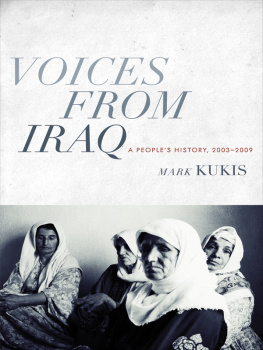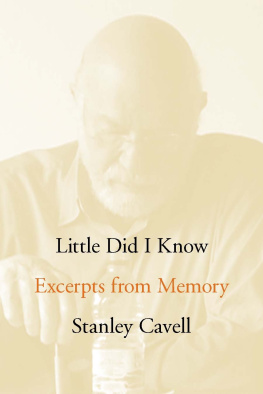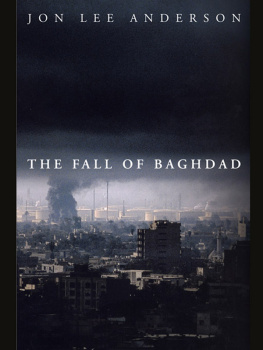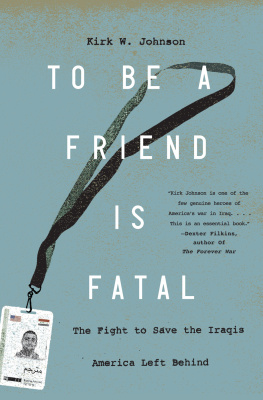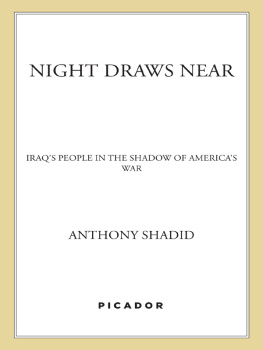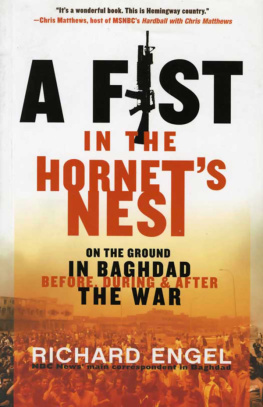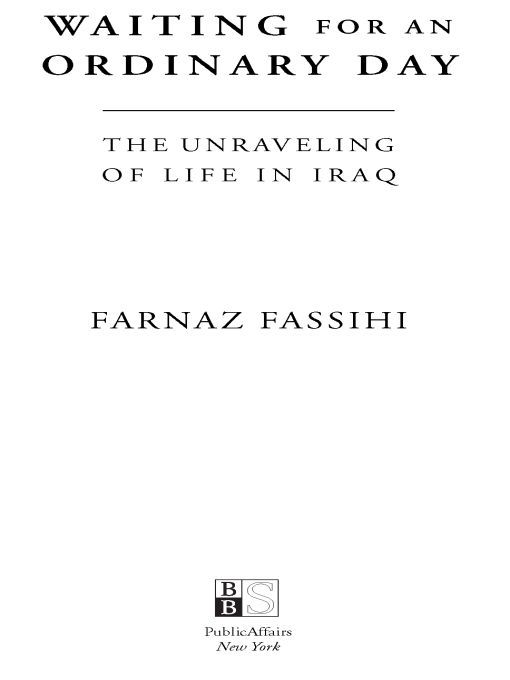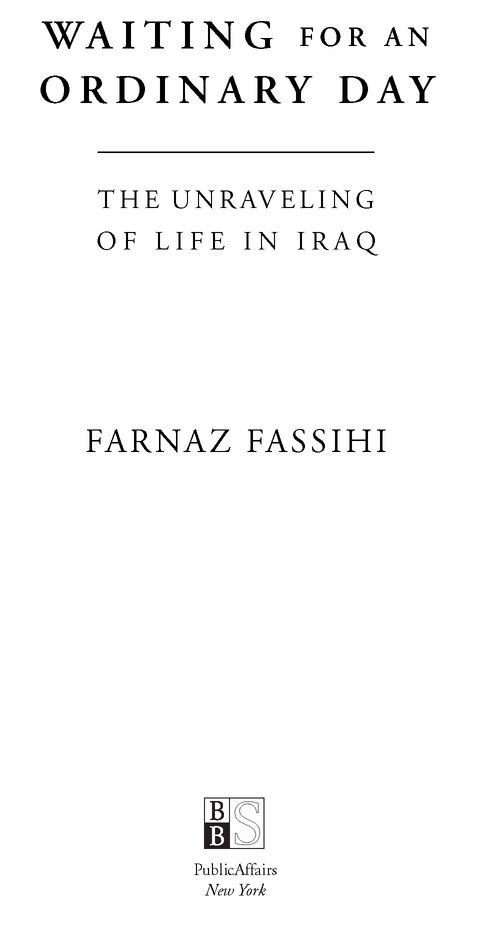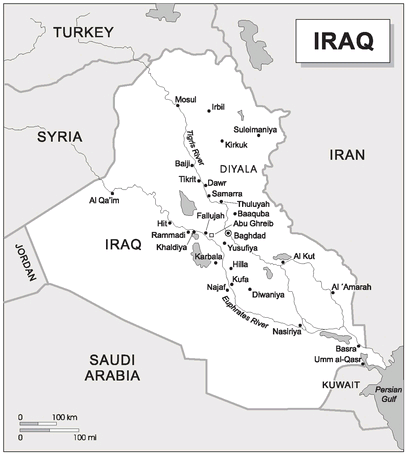Table of Contents
To my mother and my sister Tannaz
for enduring my adventures
To Babak
for turning every adventure into romance
And to my father
whose love sustains me long after hes gone
FOREWORD
I FIRST WENT TO IRAQ WHEN Saddam Hussein was still in power in October 2002 as a reporter for The Newark Star-Ledger. Then The Wall Street Journal, upon hiring me in January 2003, dispatched me immediately to northern Iraq to cover the impending war, before assigning me to Baghdad for three years. Although I wrote stories about politics and the military, my reportage focused on telling stories about ordinary Iraqis and how they coped as their country went from tyranny to military occupation and civil war. My purpose as a war correspondent was to humanize the war that seemed so alien and far away for most readers.
Over the course of my tenure in Iraq, I witnessed and documented a heart-wrenching unraveling of normal life for Iraqis. Despite the widespread coverage the media is giving Iraq, the scope of the wars impact on Iraqis remains scarcely told. In this book, I hope to paint the story of the war through the eyes of Iraqis. I also hope to offer a glimpse of what it was like for a young female reporter to live and work in Iraq during the height of the war.
Iraq defined my career as a young journalist. I felt lucky and thrilled to be given the chance to witness history in the making and to document the biggest story of my generation. On a personal level, the relentless violence I witnessed and the miseries I recorded left a deep scar. For the longest time after leaving the country, I couldnt talk about Iraq without a knot forming in my throat and tears welling up in my eyes. Writing this book has been cathartic, allowing me to lay the memories to rest.
The material here is drawn from my observations, interviews, and interactions with the Iraqi people I met and the articles I wrote for both The Wall Street Journal and The Star-Ledger.
In September 2004, I penned an e-mail to a group of family and friends that detailed the rapidly deteriorating situation and the dangers journalists were facing. The e-mail eventually made it to the public sphere, where it was posted on websites, forwarded like a chain letter across the globe, and picked up by blogs. It received national and international attention for its uncanny view of the mess in Iraq. It was also the subject of a Doonesbury cartoon. (The full text of the e-mail is printed at the end of this book.) Because I was writing to friends, I spoke freely, without the restraints of daily journalism that obliged me to be distant and objective. The emotional and personal tone grabbed the public in a way that my published pieces for the newspaper seldom did. The reaction overwhelmed me. From Australia to South Africa, the e-mail was published in local newspapers, and strangers wrote to me asking, Is it really that bad in Iraq? We had no idea.
I have written this book in the same spirit as I wrote that e-mail.
FALL 2002
Finding Baghdad
Yes, Yes, to Our Leader Saddam
My first glimpses of Baghdad are burned deep into memory, as if they belong to a vanished place.
Palm groves swish in a soft autumn breeze, as the muddy waters of the Tigris River stream through the city. The green riverbank is lined with shabby fish restaurants, and the skyline is dotted with an architectural variety of marble palaces, blue-domed mosques, gigantic statues made of steel, colonial houses with engraved balconies, and multistory, seventies-style office buildings. The roads, wide and well paved, are jammed with cars. In a crowded market, peddlers push wooden carts full of fruit and fresh herbs, and a bookstore is stocked with old translated copies of Russian literature and Shakespeares poetry.
Iraqis are rushing around carrying out their daily chores. Cafs are packed with old men playing backgammon and younger men puffing on cigarettes or hookahs. Iraqi women stroll down sidewalks, peer into shop windows, and lock arms while crossing the streets. Dressed in stylish hip-hugging pants or knee-length skirts with matching colorful shirts, they sport artfully blonde-highlighted hair. From their high-heel sandals, nail-polished toes peep out.
The city pulses with the rhythm of an urban life, almost deceptive in its normalcy.
And then I notice that Saddam Husseins face is everywhere. In whichever direction my eyes dart, on walls, shops, schools, and commercial buildings, a life-size or larger picture of Saddam Hussein grins down at me. He is portrayed in various outfits: wearing a military uniform, commanding the troops; sporting a mafia-style black hat, firing a shotgun; sitting cross-legged, sipping tea in traditional Kurdish baggy pants and fringy head wrap; and in an Arabic robe, greeting children. And he is always smiling.
Outsize Iraqi flags, green, white, and red, flutter atop government buildings. White banners stretched thin between walls announce in proud, blood-red Arabic script, Yes, yes, yes to our leader Saddam Hussein.
In a few days time, Saddam plans to stage a national referendum to counter world opinion about his lack of popularity and strength at home. In America, a United States-led military invasion into Iraq seems imminent. After spending a week sitting idly on a rigid chair in the waiting room at the Iraqi embassy in Amman, faking smiles and exchanging formal, empty greetings with Iraqi bureaucrats, my visa finally arrived. Saddam has apparently decided now is as good a time as ever to allow hordes of international journalists a rare visit (albeit controlled and strictly monitored) to his Iraq.
Once this ancient capital was famed as the jewel of the Arab world; it was a place of discovery, literature, and progress. Its been decades since Baghdads fortunes reversed. Brutal rulers have gripped its reign, and years of war, global isolation, and sanctions have turned it into a suspended place, trapped between a glorious past and an ever-ambiguous future.
Iraq has long been linked to my own trajectory. During the fall of my fourth-grade year, my little sister Tannaz and I were sprawled on our bedroom floor in Tehran, playing with Barbie dolls, when a thundering sound rattled the windows. My father scooped us up in his arms as he and Mom dashed down the stairs, taking shelter in the basement apartment of a neighbor.
Its Iraqi war planes, I remember someone saying. They have broken the sound barrier. We are at war.
Soon after, state radio and television introduced us to the sound of the red siren and white siren, which signaled when war planes were in the sky and when the threat had cleared. In school, we practiced bunker drills, our little feet stomping down the stairs to the dark basement where we huddled together on the ground. My dad taped our windows with huge Xs to prevent smashed glass from flying in the case of an attack. There were nightly blackouts, to our grave disappointment, often right around 8:00 PM, just as our favorite television show, Pippi Longstocking, aired. Food coupons for basic goods such as rice and cooking oil were distributed to households, and milk became an extravagance of the prewar days. We rationed gasoline. Days went by without hot water, forcing my mom to boil water and pour it by the potful into the chilly water of the tub to give us our lukewarm baths.


